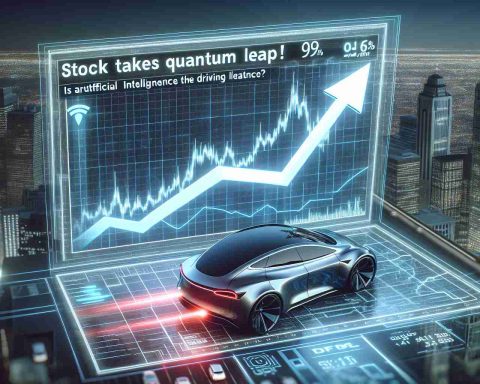Growing Interest in Hybrid Vehicles
Recent insights from Deloitte reveal a significant surge in the popularity of hybrid vehicles among U.S. consumers. The intent to purchase these environmentally friendly cars has jumped to 26%, reflecting a rise from 21% in the previous year. In contrast, interest in traditional combustion engine vehicles has declined to 62%, while enthusiasm for electric vehicles (EVs) remains stagnant at a mere 5%. The findings indicate that many consumers are drawn to the practicality and cost-effectiveness of hybrid technologies amidst increasing fuel costs.
Changing Consumer Preferences
Intriguingly, over half of U.S. consumers, specifically 54%, are contemplating a switch to different car brands for their next vehicle, highlighting diminishing brand loyalty. The drivers of this shift are rooted in quality, performance, and price, signaling a shift where consumers prioritize practicality over tradition.
Concerns Around Autonomous Technology
Despite advancements in autonomous vehicle technology, a majority of consumers express skepticism about fully autonomous ride-hailing services. Specifically, 52% convey safety concerns, while younger demographics show a willingness to embrace alternative mobility solutions. Notably, 44% of younger consumers are open to forgoing ownership in favor of mobility-as-a-service options, illustrating changing attitudes towards transportation.
Conclusion
Deloitte’s report underscores a transformative time for the automotive industry, as consumer expectations and technological advancements reshape the marketplace, prompting manufacturers to innovate in response to evolving preferences.
Surging Demand: Why Hybrid Vehicles Are Gaining Popularity Among Consumers
Growing Interest in Hybrid Vehicles
Recent data highlights a significant interest in hybrid vehicles, indicating a promising trend in the automotive market. According to a report by Deloitte, the intent to purchase hybrids among U.S. consumers has risen to 26%, up from 21% the previous year. This shift comes amid rising fuel costs and an increasing focus on environmentally friendly transportation. Traditional combustion engine vehicles are experiencing a downturn in interest, now at 62%, whereas the enthusiasm for all-electric vehicles (EVs) has remained sluggish at just 5%.
Changing Consumer Preferences
The dynamics of car ownership are evolving, with 54% of U.S. consumers considering a brand switch for their next purchase. This trend indicates a decline in brand loyalty as consumers prioritize practicality over familiarity. Factors driving this change include quality, performance, and competitive pricing. In today’s market, manufacturers must adapt to these new consumer priorities to retain relevance.
Insights on Autonomous Technology
The rise of autonomous vehicle technology has sparked debate among consumers. A notable 52% express concerns about the safety of fully autonomous ride-hailing services. Younger generations, however, are more receptive to mobile solutions, with 44% of consumers aged 18-34 expressing a preference for mobility-as-a-service over ownership. This willingness to embrace shared mobility options reflects a broader change in transportation norms, encouraging manufacturers to innovate in both vehicle technology and service models.
Pros and Cons of Hybrid Vehicles
# Pros:
– Fuel Efficiency: Hybrids provide better fuel economy than traditional combustion engines.
– Less Emission: They produce lower emissions, contributing to a cleaner environment.
– Incentives: Many regions offer tax breaks and rebates for hybrid vehicle purchases.
# Cons:
– Initial Cost: Hybrids can have a higher upfront cost compared to their gasoline counterparts.
– Battery Replacement: Over time, hybrid batteries can be expensive to replace.
– Limited Electric Range: They rely on gasoline after a certain distance, unlike electric vehicles.
Comparison of Hybrid, Electric, and Combustion Vehicles
When considering a vehicle, consumers often weigh the advantages and limitations of hybrids, electric, and traditional vehicles. Hybrids offer a middle ground, combining the benefits of electric propulsion with a gasoline engine’s range, making them suitable for those who are cautious about fully transitioning to electric. Meanwhile, EVs offer zero emissions but may be limited by charging infrastructure and range anxiety. Traditional vehicles, while familiar and easy to refuel, are less efficient and increasingly out of favor among environmentally conscious buyers.
Pricing Trends in the Automotive Market
The prices of hybrid vehicles are showing gradual stabilization, likely due to increased competition and technological advancements. While hybrids may cost more initially, their long-term savings on fuel and potential tax incentives can make them a cost-effective choice for consumers looking for economic efficiency.
Innovations Fueling Hybrid Acceptance
The automotive industry is witnessing rapid innovation, particularly in hybrid technologies. Advances in battery efficiency and energy management systems contribute to improving the performance and appeal of hybrid vehicles. Manufacturers are investing heavily in research to enhance these features, making hybrids an increasingly attractive option for many consumers.
Security Aspects of Hybrid Vehicles
As with any vehicle, security remains a crucial concern for hybrid owners. Advanced security features are integral to protecting both the vehicle’s physical components and sensitive data. Many hybrid vehicles now come equipped with advanced driver assistance systems (ADAS), ensuring safety on the road while minimizing theft risk.
For more in-depth information about vehicle trends, check out Deloitte and their analysis on automotive market changes and consumer preferences.
Final Thoughts
Deloitte’s findings illustrate a significant shift in consumer behavior, necessitating an adaptive response from automakers. With hybrids gaining traction and consumer expectations evolving, the industry must harness innovation while addressing safety concerns, ensuring a robust market presence in a new era of transportation.














